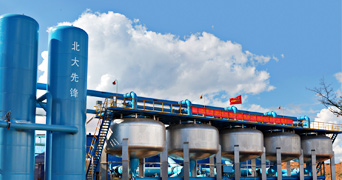Bahlil Lahadalia, Indonesia's Minister of Investment, recently stated that Indonesia's foreign direct investment (FDI) grew rapidly in the Q1 of this year, reaching 31.8%, while in the second quarter, it further rose 39.7% annually to 163.2 trillion rupiah ($10.89 billion), which is the highest rate since Indonesia calculate its foreign investment attracted on a quarterly basis in 2011 and the biggest climb in the past decade, with Singapore, China and Japan being important sources of FDI in Indonesia.
In response to this impressive growth, Bahlil explained that this is mainly because downstream projects in the mining industry are entering the construction phase. On January 1, 2020, Indonesia implemented the export ban on nickel ore, and also indicated it's considering imposing export bans on bauxite and tin this year. By restricting raw materials from exporting, Indonesia hopes to attract foreign investment to develop its industrial sectors and create jobs by allowing raw materials to be processed locally.
Attracting Investment with Nickel Ore
Nickel is a niche species of the non-ferrous metal family, initially mainly used in the production of stainless steel and other products. With the development of new energy vehicles, the importance of nickel has become more and more prominent as a crucial raw material for electric vehicle battery manufacturing.
Indonesia possesses the world's largest nickel reserves and output, and it’s also expected to dominate the future growth of global nickel production. According to the U.S. Geological Survey, the world's nickel reserves amount to approximately 94 million metric tons as of 2020, of which, Indonesia ranks first at approximately 21 million metric tons, or 22%. The advantage of natural resources has allowed Indonesia to dominate the upstream of the supply chain for a long period of time, however, it's not enough for Indonesia. By announcing export bans twice, the country attracted downstream foreign companies to set up factories interiorly for smelting and processing during the periods.
In recent years, according to public media reports, international companies such as Tesla, LG New Energy, Panasonic and others have begun to layout in Indonesia to compete for nickel resources. on May 15, Joko met with Musk, CEO of Tesla Motors in the United States. And an official statement showed that the two sides had discussions on potential investment and technology cooperation.
Many Chinese enterprises have also gone to Indonesia for investment to help upgrade Indonesia's nickel industry. According to Xinhua News Agency, when attending the commencement ceremony of the Morowali project in the Delong Industrial Park at the end of 2021, Indonesian President Joko expressed his gratitude to Chinese enterprises for building ferronickel smelters in Indonesia, which had helped Indonesia enormously increase the added value of its products, not only bringing tens of thousands of local jobs but also making great contributions to Indonesia's tax revenue and foreign exchange earnings.
Application of VPSA Oxygen Generation Technology in Nickel Smelting
According to statistics, the global nickel demand for power batteries will grow to 2.37 million tons in 2030, about six times that of 2022. High nickelization can improve the energy density and solve the pain point of low cobalt reserves and its high prices to meet the new demands of electric vehicle batteries. In practical industrial applications, high-grade nickel matte produced by low-grade lateritic nickel ore after pyrometallurgy is the raw material to manufacture nickel sulphate, which is widely used in the production of auto batteries as an indispensable core material for ternary precursors.
In the production process of high-grade nickel matte, it's a powerful method to adopt advanced oxygen-enriched side-blown furnace smelting process to replace air with enriched-oxygen for metallurgy to upgrade the smelting processes and enhance the economic efficiency of nickel matte smelters nowadays. At present, the widely used VPSA (Vacuum Pressure Swing Adsorption) oxygen plant is the preferred solution to oxygen generation. With low comprehensive energy consumption, simple operation and flexible turndown ratio regulation, VPSA oxygen units can effectively meet the demands of high-grade nickel matte smelting and help enterprises to greatly reduce the costs of oxygen production and improve the overall benefits.
As the largest manufacturer of VPSA oxygen equipment with prior performance in China, PKU Pioneer provides stable and reliable oxygen source for oxygen-rich side blow furnaces for nickel, copper, lead, zinc and other non-ferrous metal smelting. The largest capacity of PKU Pioneer's VPSA oxygen generators has reached 70,000Nm3/h (100% oxygen), and more than 40 sets of VPSA oxygen plants have been built for non-ferrous metallurgy. PKU Pioneer's VPSA-O2 units with the capacity of 2000~10000Nm3/h account for nearly 70% of the total, which meets the demand for the main oxygen flow of non-ferrous metal smelting. PKU Pioneer is the best VPSA oxygen generation technology supplier for the nickel smelting industry.




 2022-07-28
2022-07-28
